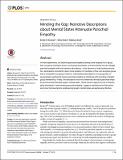Minding the Gap: Narrative Descriptions about Mental States Attenuate Parochial Empathy
Author(s)
Bruneau, Emile G.; Cikara, Mina; Saxe, Rebecca R.
DownloadBruneau-2015-Minding the Gap_ Nar.pdf (716.8Kb)
PUBLISHER_CC
Publisher with Creative Commons License
Creative Commons Attribution
Terms of use
Metadata
Show full item recordAbstract
In three experiments, we examine parochial empathy (feeling more empathy for in-group than out-group members) across novel group boundaries, and test whether we can mitigate parochial empathy with brief narrative descriptions. In the absence of individuating information, participants consistently report more empathy for members of their own assigned group than a competitive out-group. However, individualized descriptions of in-group and out-group targets significantly reduce parochial empathy by interfering with encoding of targets’ group membership. Finally, the descriptions that most effectively decrease parochial empathy are those that describe targets’ mental states. These results support the role of individuating information in ameliorating parochial empathy, suggest a mechanism for their action, and show that descriptions emphasizing targets’ mental states are particularly effective.
Date issued
2015-10Department
Massachusetts Institute of Technology. Department of Brain and Cognitive SciencesJournal
PLOS ONE
Publisher
Public Library of Science
Citation
Bruneau, Emile G., Mina Cikara, and Rebecca Saxe. “Minding the Gap: Narrative Descriptions About Mental States Attenuate Parochial Empathy.” Edited by Angela Sirigu. PLoS ONE 10, no. 10 (October 27, 2015): e0140838.
Version: Final published version
ISSN
1932-6203